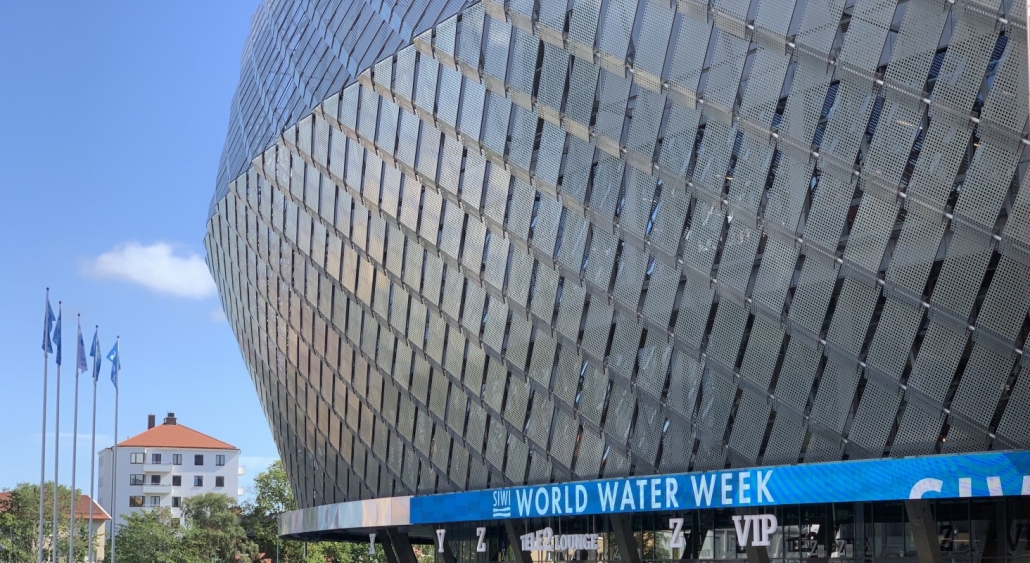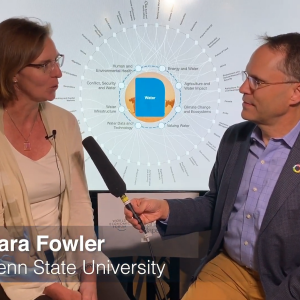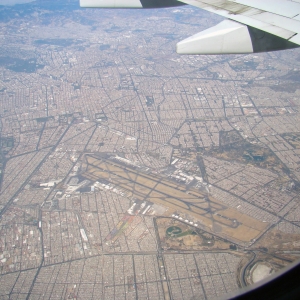Interview with Paul O’Callaghan, Founder of BlueTech Research.
Speakers
Paul O’Callaghan
Paul O’Callaghan is the Founder of BlueTech Research.
J. Carl Ganter
J. Carl Ganter is co-founder and director of Circle of Blue, the center for frontline reporting, research, and analysis on water resource issues and their relationship to food and energy in a changing climate.
BlueTech Research’s Founder Paul O’Callaghan discusses challenges, solutions, and innovation in the water sector.
Transcript
J. Carl Ganter: We’re here again on the floor of World Water Week in Stockholm and with Paul O’Callaghan, who’s looking at not only the big challenges, but some of the solutions, particularly from the the industry and finance world, and some of the big impediments and how to solve them. Paul, thanks for joining us.
Paul O’Callaghan: Pleasure. Thanks Carl.
J. Carl Ganter: Great. Well you’ve got some really exciting things going on and also really interesting perspective on who’s doing what, and where, and also maybe where some of the white spaces are. So tell me a little bit about what you’re up to.
Paul O’Callaghan: Sure. So, at BluTech, we’re tracking trends, opportunities in water, particularly around innovation, how innovation can solve water challenges. Within that there are a number of thematic shifts that you see here at Stockholm International Water Week, moves towards circular economy, sanitation economy, the role of digital as an enabler to all of that, and particularly the emerging market in the middle sector of the world population.
J. Carl Ganter: Great. So you know a lot of different pieces and it sounds complicated to somebody not in the water space. Can you tell me that in more common terms that somebody watching this from outside. What’s all that mean? What’s the circular economy for water and how’s that effect all these other pieces like investment and innovation?
Paul O’Callaghan: Yeah, I’ll do my best. Well I think we’re at a very, very interesting decade in water in that the water that we can drink is becoming less available and the water that you cannot drink is going to appear everywhere. And this is a function of climate change. And as that happens simultaneously with that, we’ve got massive urbanization, people moving to cities in unprecedented levels. Also people are moving out of poverty, which is fantastic and moving into lower-income zones and upwards. But as they do that, they need water, but they also expect access to water and sanitation. And that creates an opportunity if you can figure out how to make that happen.
J. Carl Ganter: How to make that happen and how to make it fast. So we talk about innovation, and we talk about all these different processes, but you mentioned the a decade, I mean this is, we’ve been talking about this for a long time. What’s different?
Paul O’Callaghan: Well, the changes already happening. It’s a question of accelerating it. So we view this as looking at the margins and the fringes. We’re involved in a film documentary at the moment, Brave Blue World. The objective of that is to communicate these types of messages to people out there who will get engaged with this, excited about it, optimistic, and feel that they can make a difference. And as a prior to that we’ll meet, go, and visit somewhere like Chennai, which made the news very recently because of a drought. You’d see apartment blocks that were resilient to that because they went off grid, reused their water, swept up the rain. That’s one example. We see textile mills that are going zero liquid discharge. They don’t use any water from the rivers any longer. And that’s what gives me cause for optimism because I see these projects happening and I see that the acceleration of it is the next thing. How can you make that happen faster?
J. Carl Ganter: So does it take a crisis to really tip this? I mean it seems like with Chennai, you mentioned Chennai, and São Paulo, and Cape town, and a handful of other cities maybe on the verge of being being called the day zero city that could run out of water. Does it take a crisis to push us all to make these innovations?
Paul O’Callaghan: Generally, yes. It takes a crisis to accelerate that change. If you look at, there’s been previous times, and this has happened when people began to get sick from water diseases, we started to chlorinate drinking water and we solved that problem. But we didn’t do it until we noticed there was getting urgent. Now it’s happening globally in different places. Some of the answers and solutions are the same. Whether you’re in Nairobi or whether you’re in a drought in California, some of the same solutions at play.
J. Carl Ganter: So are you seeing that is there enough money? Are you seeing that companies are stepping up and governments are stepping up? What are the missing pieces here? Because this is a grave, profound challenge that we’re facing right here today.
Paul O’Callaghan: Yeah, no, it’s real and it’s imminent. It’s here. There is an increasing willingness and ability on behalf of what were the world’s poorest people, but are now becoming low income people to be able to actually pay for water services. And they’re already paying. They’re paying because they can’t go to school. They’re paying because they pay for crappy water that you can’t drink that’s not safe. We pay a 10th of a cent a liter and they pay more than that for worse quality water. So that’s changing, but the business model has to change as well because you just can’t, if you try and solve it in the way that we solved our challenges in Europe and North America, it’s never going to happen. The problem will never get solved if you continue to try and do it that way. It’s an unsolvable problem if you do it that way. The big opportunity in the change is that people are just doing it themselves. In the same way you saw leapfrogging with telephony. They didn’t wait for government to put up telephone poles. You see the same thing playing out in water.
J. Carl Ganter: Well, again, back to these profound challenges and also I moderated a session the other day on collective action, which is a nice term, which means let’s work together. Let’s collaborate. There were two big words that came out and actually very small words, trust and fear. So how do you trust one another? And then there’s oftentimes there’s a not only a fear of the future, a fear of making mistakes, but oftentimes a fear of even working together or of failure. So, you know, how do we overcome those?
Paul O’Callaghan: Well, it takes a certain amount of bravery for sure. And part of what I see is that there are always people who are at the fringes taking those chances. The pioneers. And again, as a part of that film journey, we’ve met with many of those pioneers and we’ve heard messages, people said, “The pioneers are the guys with the arrows in their backs.” People say to us that it’s good.
J. Carl Ganter: And severe.
Paul O’Callaghan: Exactly. And you know, people were told by their boss, this could be a career-ender for you. You know what you’re doing in Orange County could be the last thing you do in your career. And they had to have the confidence to be willing to say, “Well look, there’s a risk if we do nothing as well, if we don’t do anything that’s a risk.” And they had to win the hearts and minds of people, be open and honest that there was a risk, but explain to them that they were comfortable that we can overcome this and just work in a very thorough away because you’re dealing with people’s lives here. So I think the trust is important. Bringing in multi-stakeholders. Yeah, and if people, I think fundamentally people are crucial to solving the water challenges that we face.
I mean, that’s easy to say on the people side. So what’s that actually mean? How do you motivate the people to take on these these water crises?
Yeah, and when, when I say people, I mean that you have technology, there’s finance would like to find a way to solve water challenges, then you need policy. Policies determined by politicians who ultimately are responding to their electorate. And if, what I call the taxi driver factor, is higher, when ordinary people get this, then it becomes much easier for the policy makers to try and push for those policies because they’re getting grassroots support to do that. And that’s what you see. If you go to Singapore, people get water. If you go to the Netherlands, it’s the same. Australia, and if you can try to capitalize that type of change when people see, “Yeah, okay, you know what? Why aren’t we not reusing the water? Why don’t we re-inject this water into the ground? Then it becomes much easier for the policymaker to enable the technologies to be used and bring the finance to bear.
J. Carl Ganter: Wow. So real systems approach. So last question. So a year from now, what do you think we’ll be talking about? We’ll be talking about how things have changed, how we are changing, or will there be more just general worry that we’re not changing fast enough?
Paul O’Callaghan: I think Bill Gates has a great line. He said that when we think of how much change happens in one year, we often over estimate it, but when we think about how much we change in ten years, we tend to underestimate it. And I think we’ll be very surprised, particularly in ten years time at just how much has changed. And there’ll be no fanfare and heraldry. It will just happen because people are doing it and they’re doing it out of necessity. So I think we’ll be surprised at how much will happen bit by bit, were where the needs are there.
J. Carl Ganter: Great. Well thanks so much. The cumulative effect here from World Water Week in Stockholm. I’m J. Carl Ganter for Circle of Blue.







